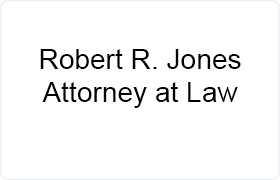 Bexar County, TX Criminal Lawyers
Bexar County, TX Criminal Lawyers
Sponsored Law Firm
-
 x
x

Click For More Info:
-
Robert R. Jones Attorney at Law
3526 E. FM 528 Suite 204 Friendswood, TX 77546» view mapCriminal Defense Expert Representation for Reasonable Rates
If you need representation, call me 24/7.
800-883-8760
Lawyers
<
61-63 of 63 matches
Medical Malpractice, Personal Injury, Insurance, Civil Rights, Criminal
Car Accident, Criminal, Juvenile Law, Domestic Violence & Neglect, International Other



 Robert Jones Friendswood, TX
Robert Jones Friendswood, TX AboutRobert R. Jones Attorney at Law
AboutRobert R. Jones Attorney at Law Practice AreasSpecializations
Practice AreasSpecializations